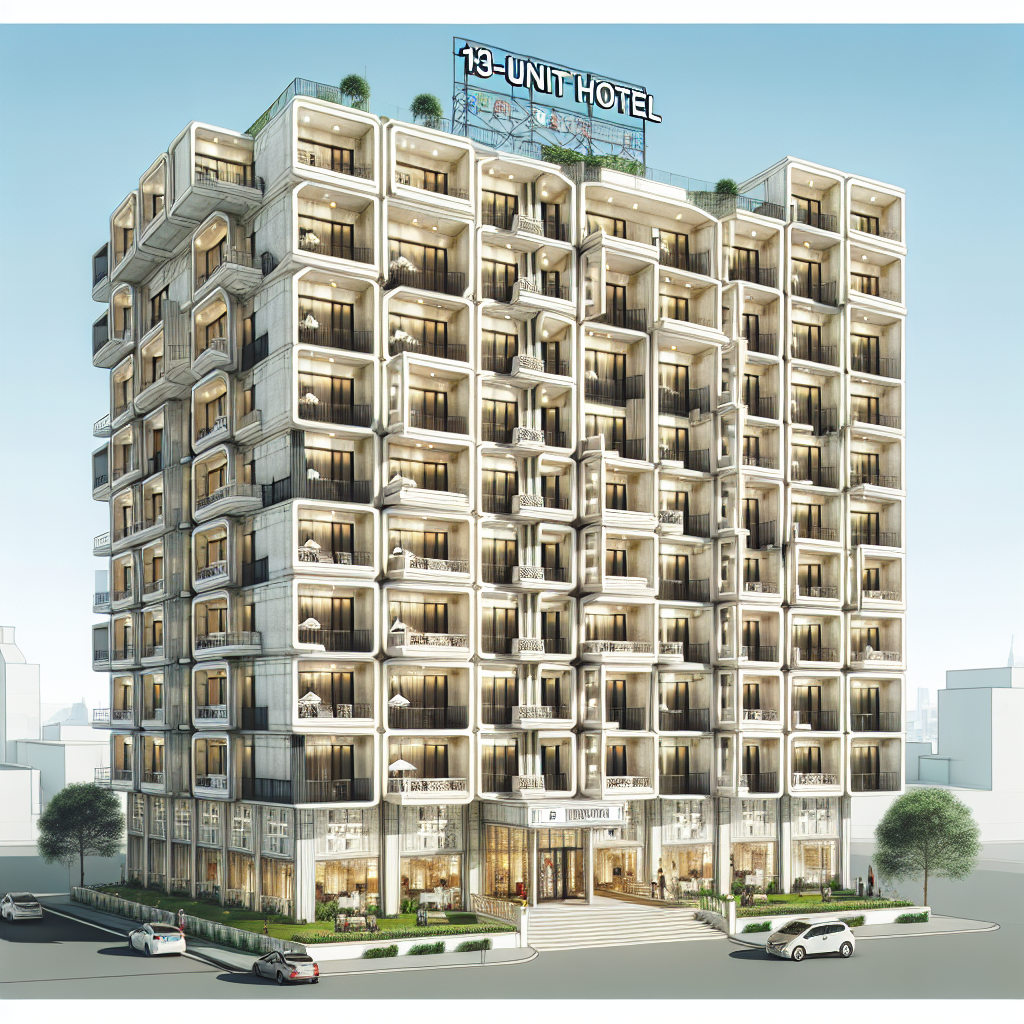-
Table of Contents
- Our First Commercial Real Estate Venture: A 13-Unit Hotel!
- The Genesis of Our Hotel Venture
- Identifying the Right Property
- Financing the Purchase
- Renovations and Upgrades
- Marketing and Branding
- Operational Challenges and Solutions
- Staffing
- Guest Satisfaction
- Financial Management
- Case Study: The Impact of Seasonal Demand
- Lessons Learned
- Future Plans and Expansion
- Conclusion
Our First Commercial Real Estate Venture: A 13-Unit Hotel!

Embarking on a commercial real estate venture can be both exhilarating and daunting. For many, the idea of owning and operating a hotel is a dream come true. This article delves into our journey of acquiring and managing a 13-unit hotel, providing valuable insights, lessons learned, and practical advice for aspiring hoteliers and real estate investors.
The Genesis of Our Hotel Venture
Our journey began with a shared vision among a group of friends and business partners. We were all passionate about real estate and saw an opportunity in the hospitality sector. The idea of owning a hotel was particularly appealing due to the potential for steady cash flow, appreciation in property value, and the ability to create a unique guest experience.
Identifying the Right Property
Finding the right property was the first and most crucial step. We had a clear set of criteria:
- Location: We wanted a property in a tourist-friendly area with high foot traffic.
- Size: A small to mid-sized hotel with 10-20 units was ideal for our first venture.
- Condition: We preferred a property that required minimal renovations.
- Price: The property had to be within our budget, with room for potential financing.
After months of research and site visits, we found a charming 13-unit hotel in a popular coastal town. The property was well-maintained, had a loyal customer base, and was within our budget. It was the perfect fit for our vision.
Financing the Purchase
Securing financing for a commercial real estate venture can be challenging. We explored several options:
- Traditional Bank Loans: We approached multiple banks to understand their lending criteria and interest rates.
- Private Investors: We reached out to potential investors who might be interested in a stake in our venture.
- SBA Loans: The Small Business Administration offers loans specifically for small businesses, including hotels.
Ultimately, we secured a combination of a traditional bank loan and private investment. This mix allowed us to minimize our initial outlay while maintaining control over the property.
Renovations and Upgrades
Although the hotel was in good condition, we saw opportunities for improvement. Our goal was to enhance the guest experience and increase the property’s value. Key upgrades included:
- Modernizing the Rooms: We updated the decor, installed new furniture, and added modern amenities like flat-screen TVs and high-speed internet.
- Improving Common Areas: We renovated the lobby, added a cozy lounge area, and upgraded the breakfast room.
- Landscaping: We enhanced the outdoor spaces with new landscaping, creating a more inviting atmosphere.
- Energy Efficiency: We invested in energy-efficient lighting and HVAC systems to reduce operating costs.
These upgrades not only improved the guest experience but also allowed us to increase room rates, boosting our revenue.
Marketing and Branding
With the renovations complete, our next focus was on marketing and branding. We wanted to create a strong brand identity that would attract guests and set us apart from the competition. Our strategy included:
- Creating a Unique Brand: We developed a brand that reflected the hotel’s charm and the local culture. This included a new logo, color scheme, and tagline.
- Building an Online Presence: We launched a user-friendly website with an online booking system, and we optimized it for search engines.
- Social Media Marketing: We created profiles on popular social media platforms and regularly posted engaging content, including photos, videos, and guest testimonials.
- Partnering with Local Businesses: We collaborated with local tour operators, restaurants, and attractions to offer exclusive packages and promotions.
These efforts paid off, as we saw a significant increase in bookings and positive reviews.
Operational Challenges and Solutions
Running a hotel comes with its own set of challenges. Here are some of the key issues we faced and how we addressed them:
Staffing
Finding and retaining qualified staff was a major challenge. We implemented the following strategies:
- Competitive Salaries: We offered competitive wages and benefits to attract top talent.
- Training Programs: We invested in ongoing training to ensure our staff provided excellent service.
- Positive Work Environment: We fostered a positive work culture with team-building activities and open communication.
Guest Satisfaction
Ensuring guest satisfaction is crucial for any hotel. We focused on:
- Personalized Service: We trained our staff to provide personalized service, addressing guests by name and anticipating their needs.
- Feedback Mechanisms: We encouraged guests to provide feedback through surveys and online reviews, and we used this feedback to make improvements.
- Consistent Quality: We maintained high standards of cleanliness and maintenance to ensure a consistent guest experience.
Financial Management
Managing the hotel’s finances required careful planning and oversight. We implemented the following practices:
- Budgeting: We created detailed budgets for each department and monitored expenses closely.
- Revenue Management: We used revenue management software to optimize room rates based on demand and market conditions.
- Cost Control: We regularly reviewed our expenses and looked for ways to reduce costs without compromising quality.
Case Study: The Impact of Seasonal Demand
One of the most significant factors affecting our hotel’s performance was seasonal demand. Our coastal location meant that we experienced high demand during the summer months and lower occupancy during the off-season. To address this, we implemented several strategies:
- Dynamic Pricing: We adjusted our room rates based on demand, offering higher rates during peak season and discounts during the off-season.
- Special Promotions: We created special packages and promotions to attract guests during the slower months, such as discounted rates for extended stays and themed weekends.
- Local Events: We partnered with local event organizers to host events at our hotel, such as weddings, conferences, and workshops, which helped boost occupancy during the off-season.
These strategies helped us maintain a steady flow of guests throughout the year, improving our overall financial performance.
Lessons Learned
Our first commercial real estate venture taught us several valuable lessons:
- Thorough Research: Conducting thorough research and due diligence is crucial when selecting a property. This includes understanding the local market, assessing the property’s condition, and evaluating potential risks.
- Flexibility: Being flexible and adaptable is essential in the hospitality industry. Unexpected challenges will arise, and the ability to pivot and find solutions is key to success.
- Guest Experience: Prioritizing the guest experience is critical. Happy guests are more likely to return and recommend your hotel to others, driving long-term success.
- Financial Discipline: Maintaining financial discipline and closely monitoring expenses is essential for profitability. This includes budgeting, revenue management, and cost control.
- Teamwork: Building a strong team and fostering a positive work environment is crucial for operational success. Happy employees are more likely to provide excellent service, leading to satisfied guests.
Future Plans and Expansion
Buoyed by the success of our first hotel venture, we are now exploring opportunities for expansion. Our future plans include:
- Acquiring Additional Properties: We are actively looking for new hotel properties in other tourist-friendly locations.
- Diversifying Our Portfolio: We are considering diversifying our real estate portfolio by investing in other types of commercial properties, such as retail spaces and office buildings.
- Enhancing Our Brand: We plan to continue building our brand by offering unique guest experiences and maintaining high standards of service.
We are excited about the future and look forward to continuing our journey in the commercial real estate and hospitality sectors.
Conclusion
Our first commercial real estate venture—a 13-unit hotel—has been a rewarding and educational experience. From identifying the right property and securing financing to managing operations and ensuring guest satisfaction, we have learned valuable lessons that will guide us in future endeavors. By prioritizing research, flexibility, guest experience, financial discipline, and teamwork, we have built a successful hotel business that we are proud of. As we look to the future, we are excited about the opportunities for growth and expansion in the dynamic world of commercial real estate and hospitality.
For aspiring hoteliers and real estate investors, our journey serves as a testament to the potential rewards and challenges of owning and operating a hotel. With careful planning, dedication, and a commitment to excellence, success in this industry is within reach.








